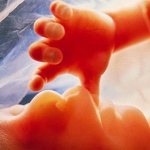Written 21st Oct 2025
If you had told Philip or I two years ago that our whole family would soon be officially received into the Catholic Church, we would have been confused, shocked and honestly rather horrified. We had both been Protestants for as long as we had been Christian, and of course being faithful Protestants meant that we had certain ‘ideas’ on what it meant to be Catholic.
Our initial motivation to look into Catholic teachings came from a desire to be more faithful to the Lord and to follow His teachings more accurately. We grew quite dissatisfied with the Protestant rhetoric of exploring our own interpretations of scripture and the idea that we could accept what made most sense to us. As believers in objective truth, we knew that there had to be a form of worship that brought the most glory to God and we were moved by the Holy Spirit to find it.
Tracing back to the very beginning however, the conversion of our family from the Anglican church to the Catholic church began at the start of our own individual faith journeys. I became a Christian at the age of 19, with my whole religious identity up until then being that of an atheist. I was raised with the idea that there was no God, and that anyone who believed otherwise was a radical and uneducated ‘science-denier’. Upon entering adulthood, I chose to devote myself fully to what I believed the world had to offer. University life was full of parties, vices and social opportunities. What I did not expect however was how utterly miserable and unfulfilled all those things had made me. I had spent much of my teenage years desiring the freedom I thought I would have as a young adult, believing what I had been told about the joys of independence and the dangers of tying oneself down into a relationship, or worse, marriage and a family. I had always been a believer in traditional values, but without a faith I had little idea of how that best translated into the real world, or even exactly why I believed those values to be correct in the first place. What resulted was correct attitudes towards gender, sexuality, abortion, and other social issues, but very little idea of how to implement those attitudes in reality. The Lord was good enough at this time to place new friends into my life who were part of the university’s Protestant evangelical group. Despite our growing differences, I am thankful beyond words to these people and remain friends with them to this day. They were the first people through whom I encountered Christ and provided a means in which I was able to grow my own faith and eventually give my life to Jesus. I found that the more I read my bible, the more I prayed and the more obedient I was to the church’s teachings, the better my life and my mental health became. My devotion to Protestant beliefs however, also marked the start of the hardening of my heart towards the Catholic church.
Like many devoted Protestants, I had been a strong believer and defender of Sola Scriptura (scripture alone) and used this to argue against many Catholic traditions. It made sense that for something with such high stakes as one’s own salvation, the only infallible and reliable source of information was scripture itself. I incorrectly at the time used this to rule out the necessity of confession, apostolic succession, the papacy and of course the veneration of Our Lady and the Saints. However, this began to change when God graciously and rather unexpectedly opened my eyes to the fact that the Bible speaks of more expectations of Christ’s followers than I had initially realised. I read Jesus’ charge to the apostles about binding and loosing. I was stunned at St Paul’s warnings to those partaking in communion without being in a state of grace, and his encouragement to hold on to the traditions passed down to us by our forefathers. Perhaps most of all, the word ‘works’, a word that is so controversial in Protestant circles, shone throughout my bible like Christmas lights. Suddenly, this text that I had used to dismiss the idea and teachings of Catholicism somehow became the most prominent signpost pointing to its truth. What was previously limited to only strictly obeying the ten commandments and leaving everything else as ‘encouraging guidelines’, I now saw my obligation as a follower of Christ to be so much deeper than I had ever imagined, and the desire to fulfill this obligation was irresistible.
Philip was brought up in a predominantly Anglican but somewhat interdenominational Protestant environment (his parents were variously from methodist and baptist backgrounds). In his youth he followed friends to a Presbyterian church and attended youth programs, finally being baptised in the Presbyterian or Reformed tradition. Attending a good Anglican school furnished him with good opportunities to discuss and defend Christianity and he had generally always taken his faith seriously. The Protestant insistence on the symbolic nature of the Eucharist, the mostly declarative nature of Baptism, the way the word ‘catholic’ in the Creed was explained, even the essentially interchangeable denominations were curious facts of life, but not necessarily alarming. He did not know much else. The pastor of the Presbyterian church that Philip was attending moved to a different church and extended deliberation began by a set of elders. Presbyterianism runs on a system of local ‘elders’ who choose a pastor from the local pool whom they prefer, and unbeknownst to Philip the elders at that church were of a specific bent, requiring a preacher who would be accepting of women preachers. For various reasons, this is an exceptionally rare position within the Presbyterian church in Australia since the creation of the Uniting Church in the 90s from the more liberal of the Presbyterian and Methodist traditions, leaving the name ‘Presbyterian’ to only the more orthodox ‘Reformed’. This left Philip to consider with fresh eyes what church he might attend since up to that time, two years of no leadership or continuity had gradually worn him down. As a soon-to-be-married University attending pair, Philip and I briefly attended an Anglican church in Glebe and found that the preaching often shied away from biblical truths if they stood against the cultural current. Specifically and critically for us, a sermon shied away from speaking from the scripture plainly when the message was engaging with St Paul’s explanation of the God designed roles of husbands and wives. We just wanted a church to give worship to God and treat the Bible straightforwardly. Providentially, we found St Albans Anglican church in Epping after a short search and attended. A church in the anglo-catholic tradition, it had given up its incense only shortly prior and had reverent liturgy. We married soon after and enjoyed a happy period. Two years later, Philip succeeded in finding an engineering position at a large corporation and we moved to Picton to work in the satellite office there. The local Anglican church welcomed us with open arms. Philip had been accustomed to this ‘lower’ form of service as a child, however doctrinal and liturgical items that had not previously seemed noteworthy made him uneasy. Instead of approaching an altar rail to receive the body, ‘bread and juice (sic)’ was distributed in the Zwinglian tradition to those seated by laypeople. Philip had grown reverent, and he was uneasy.
At the same time however, Philip was enlightened by a renewed interest in Christian doctrine, and this became the catalyst of his burgeoning conversion. What was initially a pastime pursuit of learning about the history of Vatican II became an examination of his own faith and practice. Late at night he would devour video and article content from priests of the traditional rite, and the rigour and seriousness that is appropriate to religion was clearly apparent. While he admired their approach and their adherence to tradition, he still had to be convinced that the Catholic church that he thought of as a historically oppressive and unbiblical institution was actually the true church. But instead of the denial of ‘hard truths’, Philip found meek acceptance and honest wrestling with the truth and its consequences. Thomistic clarity cut through his muddled perceptions of the Catholic church and his hard heart towards the Church that he picked up over time from polemics was suddenly torn down. Philip’s desire to be united with Christ and for continuity with the belief and practice of the saints and Apostles was satisfied.
The fact that the Holy Spirit was working through us independently yet concurrently is something that clearly reveals God’s desire to have us be part of His One, Holy, Catholic and Apostolic Church. Philip’s research allowed him to answer questions and concerns I had about what I was reading, and gracefully challenged the misconceptions I had come to believe. As soon as he showed me that all I knew about the Catholic Church had come from Protestant sources, those misconceptions toppled like dominos. This growing attraction of ours towards the church was further cemented after our first experience of a Sung Mass in the traditional Latin rite. We were initially so overcome by the beauty of the Mass that we were stunned into silence. It was only later that evening that we began to talk about what we had experienced and agreed that it was something we could not forget or dismiss. After countless discussions and hours of heated yet thought-provoking debates with one another, we came to the conclusion that we could neither remain, nor continue raising our children, as Protestants.
As if we needed further assurance of our decision, Philip and I were also becoming increasingly uncomfortable with certain attitudes of our fellow Protestants towards Catholic dogmas and traditions that related to moral theology. For example, after expressing admiration to my fellow church attendees of the practice of many Catholic families to submit to God in the number of children that they are blessed with, I was met with shock and disgust, with the conversation quickly focussing on the burdens such large families must endure and the importance of contraception in preventing such an occurrence. Similarly, as we started to ask our church leadership team more targeted questions about differences in tradition between the Anglican and Catholic churches such as the evolution of liturgy and lack of religious imagery in the church space, their response was sarcastic and half-hearted, suggesting to us that they either did not know the answers or worse, that they did not care. This only served as confirmation that we were following God’s will in joining the church that approached obedience to Christ with rigour and sincerity. As uncomfortable as it was to leave our church and the real connections we had made there, it did not overcome the love we received from our Catholic church, who were quick to celebrate our conversion and welcome us home.
Being part of the Catholic church means that we can experience a faith that is deeper, richer and fuller than anything we experienced in any Protestant church. Exposure to the sacraments allows us to receive the grace we need to make a true attempt to unite ourselves to Jesus. We are thankful to have the privilege of communion with the Blessed Virgin Mary who can point us to her Son, and for the Saints throughout history who show us that in this fallen world we can still live holy lives. It is far less lonely and less hopeless knowing that this church has 2000 years of history to fall back on, and that it has the promise from Christ Himself that it will prevail until His glorious return.










